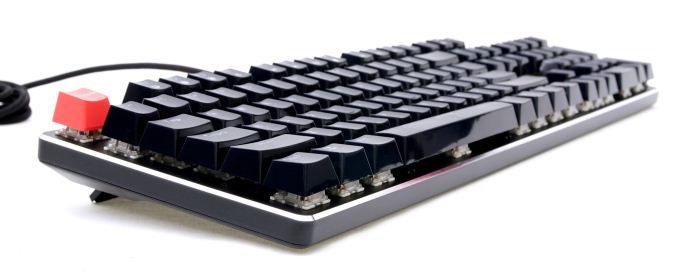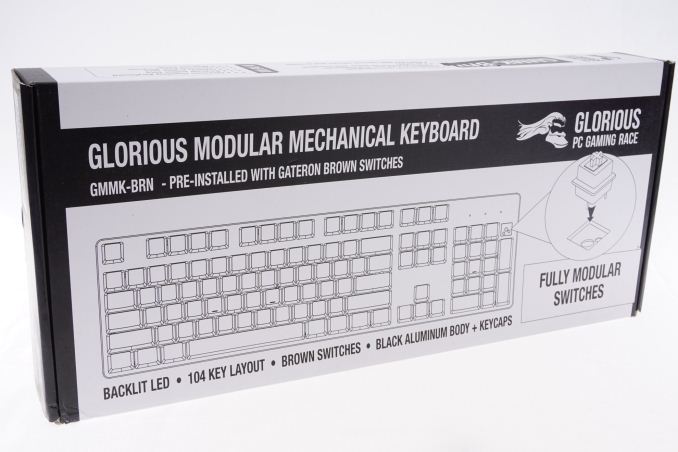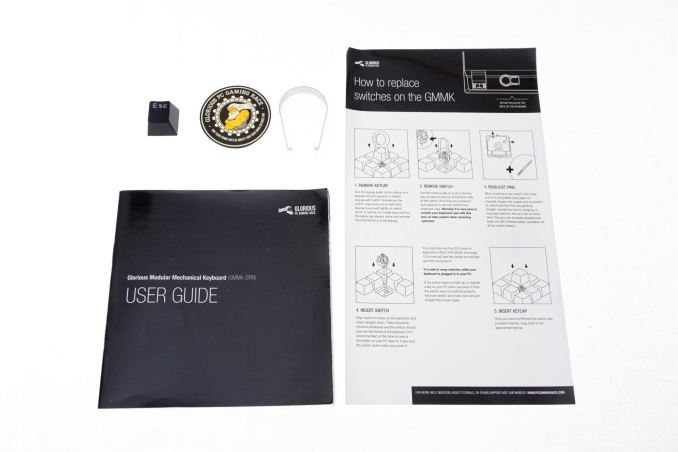The Glorious PC Gaming Race GMMK-BRN Modular Mechanical Keyboard Review
by E. Fylladitakis on November 1, 2016 10:00 AM EST
The popularity of mechanical keyboards has been rising sharply during the last few years, leading not only to the release of new keyboards from almost every company that is involved in the production of PC hardware, but to the emergence of many startup companies as well. This however has saturated the market, with very few new products actually bringing new, innovative features into the quickly maturing market. Most of the companies are nowadays trying to compete in terms of physical design and aesthetics.
One of the newest startup companies that entered the world of PC gaming peripherals is Glorious PC Gaming Race LLC. The company was founded in 2014 - their name intentionally paying homage to Reddit's popular PC Master Race gaming community - with the purpose of delivering high quality but competitively priced gaming peripherals for the aforementioned enthusiast PC gaming user base. Glorious PC Gaming Race LLC is based in Utah, USA.
In this review we will be having a look at the GMMK-BRN Modular Mechanical Keyboard, the first and only mechanical keyboard that Glorious is currently producing. While the keyboard looks very simplistic at first sight, it is capable of having its switches removed and replaced by the user. This is only the second keyboard that we have seen making use of this feature after the Epicgear Defiant, and there is a major difference: Glorious PC Gaming Race claims that any Cherry MX switch, original or clone, can be used with the GMMK-BRN, not just their own.
Packaging & Bundle
Glorious PC Gaming Race supplies the GMMK-BRN in a simple cardboard box. The artistic theme is black and white, focused on a schematic of the keyboard and highlighting its most important feature: the modular switches. It is a very sturdy box and polystyrene foam slabs protect the keyboard inside it, ensuring safe shipping
Inside the box we found a basic user’s guide, a guide on how to replace the switches (which, strangely, is also included in the main guide anyway), a round sticker, a metallic switch puller and a standard ESC keycap.












37 Comments
View All Comments
Icehawk - Wednesday, November 2, 2016 - link
Chiclet/short keys suck IMO - our work desktops from HP come with very flat keyboards and short travel and it was the very first thing I changed out. I find them super annoying when I type on them at other users desks. Tall keys just need a decent wrist rest for me to use comfortably but of course YMMVIs there any silent mechanical board out there? I have a Corsair (hate the key spacing, too narrow causing mistypes) and even with o-rings it clacks more than I like.
FUBARette - Wednesday, November 2, 2016 - link
@IceHawk: Check this out for silent mechanical keyboards. I cannot vouch for the veracity of their claims, but it seems worth a look. They've included audio clips comparing their keyboard decibels to the louder mechanical decibels. http://matias.ca/quietpro/pc/DanNeely - Wednesday, November 2, 2016 - link
At $150 for what's otherwise a no-frills design that's a really high price. Depending on what the R&D for the new switch cost it might be justifiable from a financial perspective. Not something I'd even thing about buying sight unseen though. I wonder if they'd be willing to send a review sample?Lord of the Bored - Thursday, November 3, 2016 - link
"Chiclet/short keys suck IMO " I didn't wanna be the one to say it, but... yeah.Super-short throw and as an added bonus, I use the raised key edges for tracking my location on the board and they tend to have flat keytops, leading to a lot of looking at the board.
I do find it funny how we've ridden the ramp of increasingly cheaper keyboards for so long. Early home computers had flat membranes and rubber calculator keys(Atari 400, TI 99/4, Sinclair's garbage), and then backed off of that approach for full-throw microswitches even on cheap machines like the C64... and we've steadily slid back from that high standard.
We finally hit the point where completely flat keyboards were an available option again right as the market started to swing back towards microswitches.
Mr Perfect - Wednesday, November 2, 2016 - link
The height of the mechanicals is slightly misleading, since the switches actually activate a couple mm(2mm for Cherry brand) into the switch travel. Once you feel the bump of the switch(assuming it's a tactile switch and not linear), you can release and move to the next key.Lord of the Bored brought up some good points too. Not bashing your fingers on the dome's bottom-out is nice.
BrokenCrayons - Thursday, November 3, 2016 - link
"Not bashing your fingers on the dome's bottom-out is nice."That's really not a problem if you're not heavy-handed about typing. I know a lot of people get into their games and really smash the keys as they experience a variety of emotional responses they have trouble controlling, but in those situations it's better to learn how to pay attention to and manage your emotions (or at the very least, exit the situation causing them until things get under control) than it is to buy equipment to compensate for that lack. After all, despite the "no bottom out" being espoused as an advantage, the vast majority of people will still depress the keys to their full length of travel and do the same things to their fingers they would on a rubber dome keyboard. At least with rubber domes, much of that shock is absorbed by the bumper-like soft cap under the key which minimizes shock and helps greatly with finger health versus an undampened mechanical switch.
Mr Perfect - Thursday, November 3, 2016 - link
For me, the issue was still the switch design. Rubber domes literally don't activate until they bottom out, contacting the PCB and completing the circuit. So no matter how calm someone's typing it's necessary to have an impact.On the other hand, the Cherrys activate 2mm into a 5mm travel distance, so it's really easy for me to float around without ever hitting bottom. Especially with MX Clears, there's no way I can miss the tactile bump on those suckers.
YMMV
BrokenCrayons - Thursday, November 3, 2016 - link
That just seems like such a rarity. I've watched people play video games before and they get pretty intense with the button bashing (moreso the guys since they tend to experience more intense emotions and are a lot more competitive when playing). Even typing is usually a "press down all the way" sort of thing. I think it's really wired into human minds to force the key down. Without a layer of rubber down there to soak up shock, the finger joints ultimately absorb all of that impact which really takes the wind from the sails of the different activation point argument. As durability is already a questionable benefit in the cost vs longevity argument when the mechanical costs +$100 and the membrane board retails for $15, there's just so little left to hang onto for vendors and their customers to hang onto in order to justify the costs.Anyway...since I've spent pretty much my entire working life tapping away at keyboards because of IT jobs, writing novels, and playing computer games, I've gone through a few keyboard designs to try to sort out inevitable joint issues (moreso in the past few years since arthritis and repetitive strain injuries are really catching up with me for all those decades of abuse) and I've been most comfortable with short travel distance membrane keyboards. In particular, the keyboards on the past few Dell Latitudes I've used (e6420 - e6440 and other non-ultrabook e-series notebooks in the Sandy Bridge to Haswell generations) are the most comfortable keyboards I've put my fingers on. Most desktop keyboards with membranes are pretty good for shock absorbtion, but my knuckle joints and the first finger joint beyond that are really not happy with mechanical keyboard impact at all. In that way, I sort of agree with the argument in the comments box that chiclet keyboards are a really good alternative since there's a lot less joint motion which, as anyone with a replacement knee can tell you, is responsible for wear and tear of things that don't grow back.
I can't imagine what my kids' friends are going to be like when they hit their 40s and 50s. A lot of them bring mechanical boards along with them to LAN parties we host here (big driveway so all their cars fit in it without anyone having to park on the street) and none of them pay attention to how they're typing on those things. It's only a matter of time before doing that catches up with you. I just don't think it's worth trying to justify the higher price of a mechanical keyboard with some of those vendor-invented reasons. If you do find yourself bottoming out keys anyway when you type like most people do, you're going to be doing yourself a huge favor by giving your joints some rubber cushioning even if that amount is minimal.
Mr Perfect - Friday, November 4, 2016 - link
Yeah, it's definitely human nature to bottom out. Not doing that was something I had to intentionally learn when I grabbed a used mech board.Keyboards are all so subjective anyhow. Even in the mech niche no one can agree on which switch is easiest to use. Cherry, Topre, Alps, buckling spring, linear, tactile, light springs, heavy springs, tall caps, short caps, plate mount, PCB mount etc... Definitely a first world problem.
Sudarshan_SMD - Wednesday, November 2, 2016 - link
This is certainly no the second keyboard in the market with ability to swap switches.One that I know is Teamwolf Zhuque TKL keyboard.
https://www.amazon.com/Teamwolf-Zhuque-Backlit-Mec...